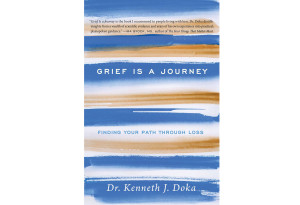3 Kinds of Grief Nobody Talks About
The author of Grief Is a Journey explains how some of our most cutting losses can go unrecognized by friends and family—and even ourselves.

Photo: milos-kreckovic/Getty Images
1) The Loss of a Person We Once Knew
Sometimes the people you love change in significant ways. They are still in your life—but not in the way you remember or once knew them. Illness often changes people, especially mental illness or dementia. In dementia, a person still is with us, but is not like the person we previously knew. The ties that bind us to one another, the shared memories and even the personality are no longer accessible. Sometimes the changes can be startling. The mother of one of my clients grew up in the segregated South. Yet her daughter was proud that her mom had been active in the civil rights movement, even though her mom lost friends and alienated family. Her mother would proudly tell the story of how, as an adolescent girl, she shamed her all-white church into integrating services. Yet, as her mom lapsed into dementia, she began using racial epithets. Her mother's language not only shocked her daughter but also called into question her mom's true beliefs. Was her mother really the progressive person she believed her to be?
Other illnesses can create a similar sense of loss. A traumatic brain injury generally affects all levels of mental function. We may grieve people as they sink into mental illness, alcoholism or drug use. Positive changes can also engender grief, when a person becomes different from the individual we knew and loved. For Tristan, it was the religious conversion of his brother. He was initially delighted that his brother found some faith, even if it was more intense than his own beliefs. But Tristan soon found it difficult to relate to his born-again brother who no longer wanted to share a beer and was always witnessing to Tristan and his family.
Similarly, Abigail was proud that her husband joined Alcoholics Anonymous after a long struggle with addiction that nearly ruined their marriage. Yet she misses the "people, places and things"—especially the pub-based dart club that was a shared activity—that her husband now avoids in order to remain sober. They celebrate New Year's Eve at an alcohol-free party sponsored by his local AA chapter in a church basement. Abby is proud of her husband and supportive of his efforts at sobriety, even as she grieves aspects of her former life.
2) The Loss of a Person We Haven't Yet Lost
Anticipatory grief is a term that refers to the grief felt about someone with a life-limiting illness; friends, family and caregivers often experience it in anticipation of an eventual death. These losses are significant. The loss of health—even the prediction of loss—contained in a diagnosis can be a source of grief not just for the person diagnosed, but also for his or her loved ones. We lose our assumptive world. All our plans, thoughts, our sense of the future— even our sense of safety and security—are now challenged. The future we know is not the one we once imagined. For Craig, his wife's diagnosis of pancreatic cancer dashed their retirement dreams of travel and possibly relocating to Tuscany. As any illness progresses, we continue to experience additional losses and grieve each one.
3) The Loss of the Person We Used to Be
Waiting for the school bus with my grandchildren recently, on the second day of school, I heard a young neighbor complain to his mother that he went to kindergarten yesterday! His mom patiently explained that he would now go five days a week to kindergarten—instead of his two-day-a-week preschool. The boy looked at her with disappointment, tears in his eyes. This changes everything! he complained.
It does. Everything changes as you age. Some changes you take in stride, but others affect you deeply. Consider the birth of a child. You may have anticipated this event for years and be overjoyed. But you also know life will be different now; over the next couple of decades, your own freedom will be limited—and for a shorter period, so will your sleep.
Each transition in our lives—no matter how positive—has an undercurrent. The thrill of passing your driving test and earning your license held so much meaning, a mark both of accomplishment and maturity that promised new freedom and adventure. Now, imagine the pain and grief when, through age or disability, you are forced to surrender that license and all it has meant.
Remember: Grief is not always about death, but it is always about attachment and separation. Often, people endure pervasive and intense distress without having faced the death of a loved one at all. Further, in these cases of unrecognized losses, our grief is often not recognized by others, either. But you can grieve the loss of anything, anywhere or anyone to whom you had become attached—no list could name all the possibilities. To deal with the sorrow, you may need to find confidants, counselors and support groups that can assist you. Above all, you need to have your grief acknowledged. Allowing yourself to understand the validity of your emotions is the only way to begin feeling better. You are not the only one to have mourned in these situations—and you are not alone.
 This adapted excerpt was taken from Grief Is a Journey, by Kenneth J. Doka, PhD. Dr. Doka is a professor of gerontology at the Graduate School of The College of New Rochelle and a senior consultant to the Hospice Foundation of America.
This adapted excerpt was taken from Grief Is a Journey, by Kenneth J. Doka, PhD. Dr. Doka is a professor of gerontology at the Graduate School of The College of New Rochelle and a senior consultant to the Hospice Foundation of America.
Sometimes the people you love change in significant ways. They are still in your life—but not in the way you remember or once knew them. Illness often changes people, especially mental illness or dementia. In dementia, a person still is with us, but is not like the person we previously knew. The ties that bind us to one another, the shared memories and even the personality are no longer accessible. Sometimes the changes can be startling. The mother of one of my clients grew up in the segregated South. Yet her daughter was proud that her mom had been active in the civil rights movement, even though her mom lost friends and alienated family. Her mother would proudly tell the story of how, as an adolescent girl, she shamed her all-white church into integrating services. Yet, as her mom lapsed into dementia, she began using racial epithets. Her mother's language not only shocked her daughter but also called into question her mom's true beliefs. Was her mother really the progressive person she believed her to be?
Other illnesses can create a similar sense of loss. A traumatic brain injury generally affects all levels of mental function. We may grieve people as they sink into mental illness, alcoholism or drug use. Positive changes can also engender grief, when a person becomes different from the individual we knew and loved. For Tristan, it was the religious conversion of his brother. He was initially delighted that his brother found some faith, even if it was more intense than his own beliefs. But Tristan soon found it difficult to relate to his born-again brother who no longer wanted to share a beer and was always witnessing to Tristan and his family.
Similarly, Abigail was proud that her husband joined Alcoholics Anonymous after a long struggle with addiction that nearly ruined their marriage. Yet she misses the "people, places and things"—especially the pub-based dart club that was a shared activity—that her husband now avoids in order to remain sober. They celebrate New Year's Eve at an alcohol-free party sponsored by his local AA chapter in a church basement. Abby is proud of her husband and supportive of his efforts at sobriety, even as she grieves aspects of her former life.
2) The Loss of a Person We Haven't Yet Lost
Anticipatory grief is a term that refers to the grief felt about someone with a life-limiting illness; friends, family and caregivers often experience it in anticipation of an eventual death. These losses are significant. The loss of health—even the prediction of loss—contained in a diagnosis can be a source of grief not just for the person diagnosed, but also for his or her loved ones. We lose our assumptive world. All our plans, thoughts, our sense of the future— even our sense of safety and security—are now challenged. The future we know is not the one we once imagined. For Craig, his wife's diagnosis of pancreatic cancer dashed their retirement dreams of travel and possibly relocating to Tuscany. As any illness progresses, we continue to experience additional losses and grieve each one.
3) The Loss of the Person We Used to Be
Waiting for the school bus with my grandchildren recently, on the second day of school, I heard a young neighbor complain to his mother that he went to kindergarten yesterday! His mom patiently explained that he would now go five days a week to kindergarten—instead of his two-day-a-week preschool. The boy looked at her with disappointment, tears in his eyes. This changes everything! he complained.
It does. Everything changes as you age. Some changes you take in stride, but others affect you deeply. Consider the birth of a child. You may have anticipated this event for years and be overjoyed. But you also know life will be different now; over the next couple of decades, your own freedom will be limited—and for a shorter period, so will your sleep.
Each transition in our lives—no matter how positive—has an undercurrent. The thrill of passing your driving test and earning your license held so much meaning, a mark both of accomplishment and maturity that promised new freedom and adventure. Now, imagine the pain and grief when, through age or disability, you are forced to surrender that license and all it has meant.
Remember: Grief is not always about death, but it is always about attachment and separation. Often, people endure pervasive and intense distress without having faced the death of a loved one at all. Further, in these cases of unrecognized losses, our grief is often not recognized by others, either. But you can grieve the loss of anything, anywhere or anyone to whom you had become attached—no list could name all the possibilities. To deal with the sorrow, you may need to find confidants, counselors and support groups that can assist you. Above all, you need to have your grief acknowledged. Allowing yourself to understand the validity of your emotions is the only way to begin feeling better. You are not the only one to have mourned in these situations—and you are not alone.
 This adapted excerpt was taken from Grief Is a Journey, by Kenneth J. Doka, PhD. Dr. Doka is a professor of gerontology at the Graduate School of The College of New Rochelle and a senior consultant to the Hospice Foundation of America.
This adapted excerpt was taken from Grief Is a Journey, by Kenneth J. Doka, PhD. Dr. Doka is a professor of gerontology at the Graduate School of The College of New Rochelle and a senior consultant to the Hospice Foundation of America.



